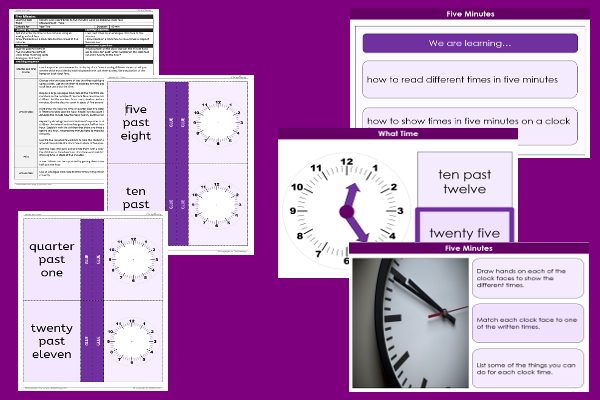Lesson Four – Five Minutes

This maths teaching pack for Key Stage One gets the children to investigate how to identify, record and match different times to five minutes using an analogue clock face showing the correct positions for the clock’s hands.
The class can explain and model how to position the hour and minutes hands on a clock face correctly to indicate the correct times in steps of five minutes past the hour.
Download this teaching pack including a lesson plan, classroom activities and an interactive presentation to identify, record and match different times to five minutes using an analogue clock face showing the correct positions for the clock’s hands
Activities in this teaching pack include a set of cards to select and pair some different times in steps of five minutes to match a range of word phrases and the correct positions of the hour and minute hands on analogue clock faces for each matched time.
The interactive presentation gets the children to explore how to identify, record and match different times to five minutes using an analogue clock face.
This lesson is part of a maths scheme of work to get the children to read, match and record times to five minutes using analog and digital clock faces that can identify start times for different events and experiences. There are teaching activities for shared learning, differentiated worksheets to support independent learning and interactive presentations to introduce concepts and key skills.
-

Garden Numbers
Identify and model some of the different calculation techniques that can be used when adding pairs of single digit numbers
-

Summer Stories
Practise composing and presenting narrative stories with familiar settings to illustrate the events and experiences that could happen during the summer
-

Fraction Numbers
Investigate how to use concrete equipment, diagrams and calculations to identify and record the matching fractions of different numbers
-

Family Holiday Lists
Explore how to compile sentences punctuated using commas to list some of the special things that families can use, complete and experience on a holiday
